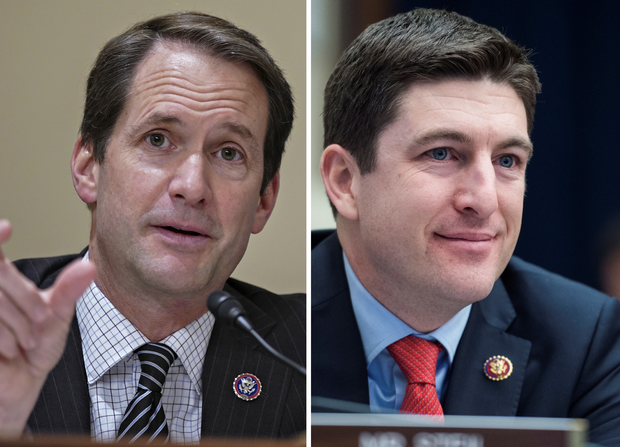Connecticut Democrat Jim Himes is pessimistic about near-term relief from sky-high gas prices as the national average nears $5 a gallon. Rep. Himes, a supporter of President Biden, says the administration’s options are limited.
“There’s really almost nothing that the Biden administration could do today that would have an impact on near-term energy prices,” said Himes, the chairman of the House Select Committee on Economic Disparity and Fairness in Growth.
Rep. Jim Himes (Al Drago/Bloomberg via Getty Images) / Rep. Bryan Steil (Tom Williams/CQ Roll Call)
His Republican counterpart on the committee is ranking member Rep. Bryan Steil, Republican of Wisconsin, and the two joined CBS News chief Washington correspondent Major Garrett on “The Takeout” podcast this week. Steil thinks the administration could do more to bring energy prices down.
“I think we need to change course on our energy policy and unleash American energy to lower those costs,” Steil told Garrett. He argues that ramping up domestic oil and gas production and restarting the Keystone XL pipeline project could ease prices, even though it would be years before oil flowing through the pipeline would hit the market.
Those moves, Steil argued, could give investors confidence. “They’ve pulled back because they’re concerned about obtaining full permits to get from exploration into full production.”
Himes fears such policies would just lead to environmental catastrophe. “If we just decided to do what some of my Republicans want to do, which is burn all the coal, burn all the gas, burn all the petroleum. Good luck for the next generation that’ll be dealing with the problems of climate change.”
Their committee was created by Nancy Pelosi in 2020 to tackle wealth disparities in the U.S. economy. A Wall Street Journal poll released earlier this week found that 83% of Americans are unsatisfied with the current state of the economy.
The congressmen also touched on gun violence, after recent mass shootings in Buffalo and Uvalde, Texas.
Himes, whose district borders the site of the 2012 Sandy Hook Elementary School shooting, wants to see Congress take action on gun control. He’d like to see expanded background checks for gun purchases, an idea that is supported by a majority of Americans and currently under consideration in Congress. “Not only should we study it, by the way, let’s have an honest conversation about this.”
But Steil is skeptical of federally funded studies of gun violence. “I think the broad concern is whether or not we’re going to see a biased report from a federal agency rather than an unbiased report.”
Highlights from this week’s episode
- Himes on long-term solutions to illegal immigration: “At the end of the day, what is going to solve the illegal immigration problem in the long run is going to be to do away with the economic incentive for people to come here. Right. That means cracking down on people who were hiring the undocumented illegally. It means it means and I know that this is dull and hard to talk about, but it’s true. It means working with countries like El Salvador and Honduras to turn them into places that people want to stay in. In the long run. That’s what’s going to fix our border issue.”
- Steil on immigration: “The United States is always going to be a beacon of hope, pulling people in, having people wanting to come to the United States, that’s positive. We have to be able to control who comes in a legal and orderly manner, and we have to hold businesses accountable that are hiring and employing illegal immigrants, as the chairman noted.”
- Himes on the oil and gas industry: “The reality today is and this is not disputable, is that the energy companies who make their investment decisions, not based on what the guy in the Oval Office is doing, but based on their forecast of economic markets. They are sitting on unused leases. They are doing the same investment plans that they planned to do five years ago. They are making decisions based on the market, dropping away dividends.”
- Steil on whether mass shootings are just something we have to live with: “We should not live with one mass shooting. The challenge is what are the policies we need to put in place to address it? I’ve offered three that I think we come together on to address this crisis. I think we could come together. I think there’s areas of agreement and particulars relates to school resource officers. The relates to mental health and as relates to getting serious on gun crime writ large.”
Executive producer: Arden Farhi
Producers: Jamie Benson, Jacob Rosen, Sara Cook and Eleanor Watson
CBSN Production: Eric Soussanin
Show email: TakeoutPodcast@cbsnews.com
Twitter: @TakeoutPodcast
Instagram: @TakeoutPodcast
Facebook: Facebook.com/TakeoutPodcast
